Text
also server costs and the instability that dogs the steps of our community members.
a lot of the really amazing projects are collective and run by little community orgs or artist collectives that disband or lose funds so the server goes down even if it was independently managed. web archives of the page if it was archived are broken due to increasing browser incompatibility. it's like this churn of recreating the same things over and over again. a beautiful digital project displaying non-normative bodies will amass a solid range of submissions and disappear two years later. god it sucks. constant state of recovery
as an aroace person with limited sexual experience, no interest in watching porn, and poor sex ed as a teen, there IS something simultaneously funny and vaguely tragic about being 28 adult years old and realising how extremely tiny your frame of reference is for genitalia and deciding you should expand this to better understand bodies (yours and others). and then you're just there like "okay so what the fuck do I even google right now, anyway"
567 notes
·
View notes
Text
no, I lied, I'm not done. I spent way too long looking for this photography archive documenting trans nude portraits specifically. lost to the ether. found other stuff though:
Archive of Body Alchemy: Transsexual Portraits by Loren Cameron, which includes images of genitalia in its "Genital Reconstruction" section, page 46. Portraits of clothed trans masculine people other than the author begin on page 34 in the "New Man Series."
A Genitoplasty Diary by Lou Sullivan (1984-1987) (no images but fascinating)
the evergreen Trans Bodies, Trans Selves
not useful at all, but an extremely cool in-browser recreation of a 90s mac in order to run a 90s trans information CD-Rom.
as an aroace person with limited sexual experience, no interest in watching porn, and poor sex ed as a teen, there IS something simultaneously funny and vaguely tragic about being 28 adult years old and realising how extremely tiny your frame of reference is for genitalia and deciding you should expand this to better understand bodies (yours and others). and then you're just there like "okay so what the fuck do I even google right now, anyway"
#combing back trying to find projects that have since died :( you're so right it's a wasteland of dead links it's so tragic#hope to god that portrait gallery got archived somehow
567 notes
·
View notes
Text
totally, the London Transgender Clinic and Dr. Keelee MacPhee have a variety of before and after photos related to various gender affirmation procedures.
i think that r/GrowYourTDick is the best repository of images of specifically trans masculine bottom growth. I can't comment on the culture of the forum, but there is absolutely a lot of images of transmasculine genitalia and extensive discussion of physical changes.
For (relatively*) trustworthy information, Hudson's FTM Resource Guide contains a lot of information about medical side effects and Things To Generally Be Aware Of, like increased risk for yeast infections and tips for managing locker rooms/swimming. *I can't verify that this information is up to date
I'm not directly connected to any trans masc transition support networks, but i know that discord is a thriving space for transition support and information sharing. i think it would be relatively easy to find positive community there. they often compile resources and information for members as well as provide topical discussion spaces. here's the disboard listings for public trans masc oriented servers
and this is just a really beautiful series of portraits of trans masculine people.
that about taps me out on resources!
as an aroace person with limited sexual experience, no interest in watching porn, and poor sex ed as a teen, there IS something simultaneously funny and vaguely tragic about being 28 adult years old and realising how extremely tiny your frame of reference is for genitalia and deciding you should expand this to better understand bodies (yours and others). and then you're just there like "okay so what the fuck do I even google right now, anyway"
567 notes
·
View notes
Text
why wouldn't it be thank you? you expressed interest in sexual education materials related to genital body diversity, and i keep these resources on hand for exactly that purpose.
it's natural to be curious about bodies--yours and others. the presence or lack of sexual intent motivating that curiosity is irrelevant. they're just body parts
I also found one of my favorites I couldn't find this morning: The Great Wall of Vulva and their Labia Library
as an aroace person with limited sexual experience, no interest in watching porn, and poor sex ed as a teen, there IS something simultaneously funny and vaguely tragic about being 28 adult years old and realising how extremely tiny your frame of reference is for genitalia and deciding you should expand this to better understand bodies (yours and others). and then you're just there like "okay so what the fuck do I even google right now, anyway"
#critique my dick pic is obviously more sexually charged than the others but it remains one of the most body diverse and respectful#dick-oriented collections of real genitals available#and while there are multiple labia projects ongoing (few for free) there are few dick projects because exposure to dicks is presumed#whether or not those dicks represent real body diversity is completely ignored#there is also the vulva gallery but i do not like it as much because they're 'portraits' rather than real genitals. kinda cutsey drawings
567 notes
·
View notes
Text
The Great Wall of Vulva
Large Labia Project
Labia Library
Breast Gallery-Nonsexualized Images of real, anonymously submitted breasts
Critique My Dick Pic [tumbex archive]-real submitted dick centric nudes
as an aroace person with limited sexual experience, no interest in watching porn, and poor sex ed as a teen, there IS something simultaneously funny and vaguely tragic about being 28 adult years old and realising how extremely tiny your frame of reference is for genitalia and deciding you should expand this to better understand bodies (yours and others). and then you're just there like "okay so what the fuck do I even google right now, anyway"
567 notes
·
View notes
Text
Kate Bornstein calls Leslie Feinberg “daddy” (1996)
Watch the full interview here:
youtube
218 notes
·
View notes
Text
who can be surprised. rationalism is based on concpets of the "rational actor," an economic principle about which the inventor commented "no political economist was ever so absurd as to suppose mankind are really thus constituted."
when the guy who invented it called it absurd to believe it as fact, it is hysterically unsurprising that a group of people who chose to build their entire lives and political identities around it are, in fact, absurd.

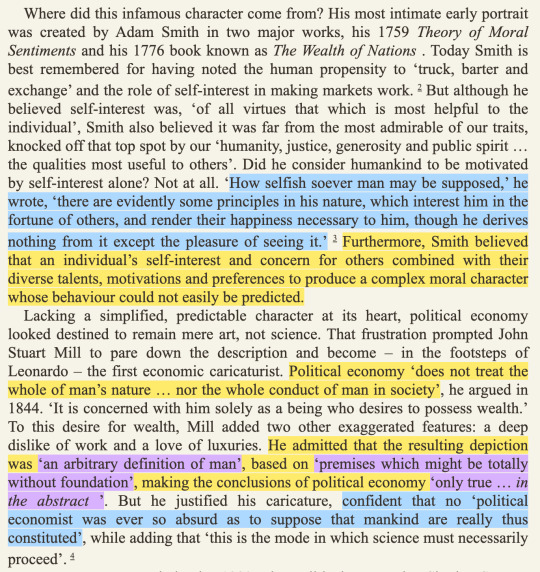
via Doughnut Economics, Kate Raworth

Hate the ratsphere all you want no one generates ludicrous discourse like we do
1K notes
·
View notes
Text
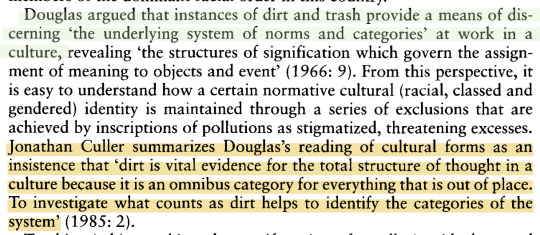
via unpopular culture: the case of white trash, john hartigan

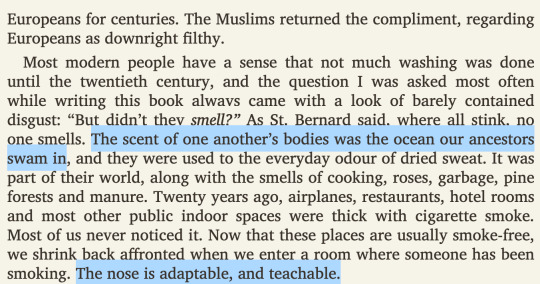
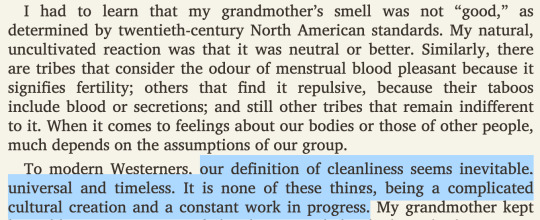

via The Dirt on Clean: An Unsanitized History by Katherine Ashenburg
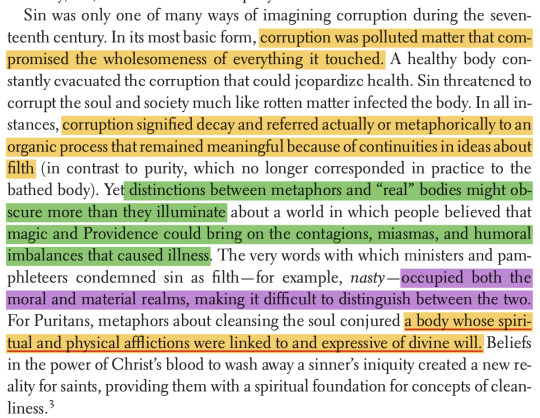
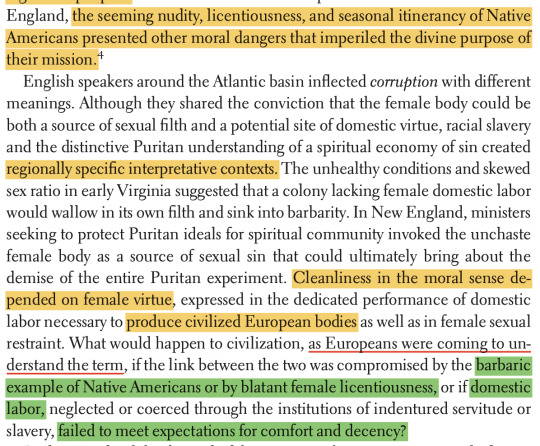

via Foul Bodies: Cleanliness in Early America kathleen m brown
[T]hey frequently transgress the spatial boundaries imposed by humans to organize and govern spaces […]. [W]etlands spread out and do not conform to the straight and consistent lines between land and water. […] The smells of wetlands, of decomposing vegetation, of sulphur, were […] off-putting for [British] settlers in Aotearoa […]. Soon after the British-led military invasion of the Waikato region in 1863 and the confiscation of 480 000 ha of Maori lands, [...] [t]he ‘great swamp region of the Waikato’ was described as a picture of ‘desolation’ and ‘stagnant water’ where the ‘ground quaked and quivered beneath’ one's feet, and opened up unexpectedly to suck people down into ‘horrible depths of [the] black, stinking bog’. […] The omnipresent dangers of ‘damp vapour arising’ were deemed ‘highly prejudicial to residents’ health throughout Aotearoa. […] The ‘tepid swamps’, it was reported, poisoned the ‘otherwise pure air’ […].’ The Napier Swamp Nuisance Act enabled local government officials to ‘fill in’ (meaning to drain, establish levees, and build up the soil) any parcel of land deemed a muddy watery odorous ‘nuisance’ without the consent of the landowners. […] [P]oliticians suggested [that Aotearoa] be decontaminated through strategic interventions to remove and remake wetlands […]. Such ideas, which fused medical and socio-economic theories, justified indigenous dispossession and drainage works […].
Text by: Meg Parsons and Karen Fisher. “Historical smellscapes in Aotearoa New Zealand: Intersections between colonial knowledges of smell, race, and wetlands.” Journal of Historical Geography Volume 74, pages 28-43. October 2021.
---
On 24 December 1928 Italy’s fascist regime launched […] a fourteen-year national land reclamation programme aimed at [...] Italy's ‘death inducing’ swamps […]. The Pontine Marshes, a marshland spreading across 75,000 hectares south of Rome was given top priority […]. [T]he fascist regime used an extensive propaganda machinery to promote the programme […] as a heroic quest for producing an 'ideal' [...] landscape [...]. Newsreels documented step by step the struggle […], with Mussolini himself often featuring, overseeing the project, or even working the land. […] Nearly 3,000 newsreels and many documentaries were produced [...]. This was [...] [among] Italy's most important public works project[s] [...], a transformative enterprise that [...] would engage with an "untamed" natural environment and [force] it into a sanitised version of ideal fascist nature. [...] [The marshes] were linked to the idea of wilderness, [...] undisciplined, uncivilised, and unproductive [...]. This policy […] aimed […] [at] removing “unhealthy” [...] areas, through the process of sventramento (disembowelment). […] The construction of New Towns [...] in the Pontine Marshes [...] aimed at producing the 'ideal' settlement [...]. [These newly constructed] municipal buildings often boasted prominent towers [....] reigning supreme over the Marshes [...].
Text by: Federico Caprotti and Maria Kaika. “Producing the ideal fascist landscape: nature, materiality and the cinematic representation of land reclamation in the Pontine Marshes.” Social & Cultural Geography Volume 9. 2008.
---
[I]n Recife in the Northeast of Brazil [...] the transformation of the city was predicated on [...] [a] notion of whiteness that required the enclosure of wet, amphibious space to make dry land. [...] Racialised groups – of black, indigenous, and mixed heritages – and the houses, marshlands, and mangroves where they lived, were subject to eradication [...]. [F]rom the 1920s to 1950s, during the rise to hegemony in Brazil of [a form of eugenicist, modernist nationalism,] [...] [the] idea's heartland [was] the Northeast. [...] Recife is also a centre of Brazilian black culture [...]. One of the key sites in Brazil's slave and sugar trades [...], the city was [...] [a] hub. Many of these people lived in what came to be called mocambos, a word that designated an informal dwelling, but came to mean much more. [...]. Mocambos were seen as [...] the place where exploited labour was kept out of sight. [...] They were also [...] the inheritance [...] of the quilombo - the community of escaped slaves. [...] In July 1939, the proto-fascist administration [...] of Agamenon Magalhães, put in place by Getúlio Vargas' repressive Estado Novo, launched the Liga Social Contra o Mocambo (Social League Against the Mocambo, LSCM). The League emerged out of a tellingly named “Crusade” against the mocambos. [...] Mocambos were characterised as repellent, unhygienic, and dangerous: “the mocambo which repels. The mocambo which is the tomb of a race … a sombre landscape of human misery … which mutilates human energy and annuls work" [...]. These were the decades of the embranquecimento of the Brazilian population through public policies of immigration, miscegenation, and sterilisation [...]. This white supremacist ideology was inseparably a politics of nature. Magalhães wrote [in 1939]: The idle life, the life that the income of the mocambos provides [...]. It is a life of stagnant water. … [that] generates in its breast the venom of larvae, which are the enemies of life. Enemies of life, as are the mocambos and the sub-soil of cities, where the polluted waters contaminate pure waters [...]. Attempts to “cleanse” the city functioned through a distinct process: aterramento, the making of land. [...] Or as 1990s mangue beat [mangrove beat] musicians [...] put it, “the fastest way also to obstruct and evacuate the soul of a city like Recife is to kill its rivers and fill up its estuaries” [...].
Text by: Archie Davies. "The racial division of nature: Making land in Recife". Transactions of the Institute of British Geographers Volume 46, Issue 2, pp. 270-283. First published 29 November 2020.
#marking bounds of acceptability with pollution ideology#conflation between metaphorical and material
67 notes
·
View notes
Text
relevant reading:
The Myth of the Boner Werewolf
Then again, I wonder why more men aren't just insulted by the whole concept. If someone started telling stories about how my gender was controlled by our genitalia and sexual arousal turns us into rapist automatons, I would be outraged. I would explain in very small, very loud words that I am a person and I can goddamn control myself. I wish more men would speak up to say "actually, even when I can't turn my erection off, I can sure as hell use the rest of my body to put it somewhere it won't bother anyone.
Men aren't rollercoasters. They aren't werewolves. They aren't walking penises. They're people. They make decisions. Let's stop talking about "he couldn't stop himself" and start talking about "he decided not to stop." Men deserve that dignity, and the responsibility that comes with it.
The Will To Change: Men, Masculinity, and Love by bell hooks (Chapter Five, Male Sexual Being)
Feminist movement was able to challenge and change notions of female inequality on many fronts, particularly in such arenas as work, education, and religion. However, sexism continues to shape the ways most people think about sexual relations. No matter how many men in our nation are celibate or have only occasional sexual experiences, people still believe that sex is something men have to have. Underlying this assumption is the belief that if men are not sexually active, they will act out or go crazy. This is why male-on-male sexual violence is accepted in our nation’s prisons. This is why rape—whether date rape, marital rape, or stranger rape—is still not deemed a serious crime. This is why the rape of children, especially when conducted by mild-mannered, nice men, is allowed. If this were not so, celebrities accused of sexually abusing children would no longer be cultural icons. The assumption that “he’s gotta have it” underlies much of our culture’s acceptance of male sexual violence. It is why many people continue to believe that anyone who is raped may have “asked for it” by “seductive” dress or behavior, no matter how many television programs have aired the facts about sexual violence.
Children today learn more about sex from mass media than from any other source. Whether watching daytime soap operas, a porn channel, or X-rated movies, children in our nation are more aware of the body and of sexuality than ever before. Yet much of what they are learning about sexuality conforms to outmoded patriarchal scripts about the sexual nature of men and women, of masculine and feminine. They learn that in the world of sexual relations there is always a dominant party and a submissive party. They learn that males should dominate females, that strong men should dominate weaker men. They learn that whether he is homosexual or heterosexual, a man deprived of sexual access will ultimately be sexual with any body. If deprived long enough, even if he is straight he will have sex with another man; if he’s gay, deprivation will lead him to engage in desperate sexual acts with women. Again and again children hear the message from mass media that when it comes to sex, “he’s gotta have it.” Adults may know better, from their own experience, but children become true believers. They think that men will go mad if they cannot act sexually. This is the logic that produces what feminist thinkers call “a rape culture.”
Males, whether gay or straight, learn early on in life that one of the primary rewards offered to them for obedience to patriarchal thought and practice is the right to dominate females sexually. And if no female is around, they have the right to place a weaker male in the “female” position. In the anthology Victims No Longer: Men Recovering from Incest and Other Sexual Child Abuse, men who have been victimized by stronger boys, brothers, and other male peers share how the logic of patriarchal thinking about the right of the strong to do as they wish with those whom they deem weak was presented to them by their abusers. This same logic has usually shaped the thinking about sexuality embraced by adult abusers. Ed writes of his older brother’s sexual abuse of him: “I learned about sex when I was nine years old. I was giving blow jobs at ten. While other kids were out playing with guns, I was learning how to ‘please’ a man. I was taught how to be a ‘woman.’ My brother liked to act out fantasies in which he was the ‘man’ and I was the ‘woman.’ ” This older brother married and took with him into marriage the notion that it was his right to have sex with anyone he desired, whether they wanted to or not. His need to dominate was the salient feature in all his sexual relationships.
Within a culture of domination struggles for power are enacted daily in human relationships, often assuming their worst forms in situations of intimacy. The patriarchal man who would never respond to demands from his boss with overt rage and abuse will respond with fury when intimates want him to change his behavior. Men who do not daily lie and cheat at their jobs do so in their intimate bonds. This lying is usually connected to inappropriate sexual behavior or to discomfort about sexual behavior. In his powerful essay “Who He Was,” Eric Guitierrez recounts how he told lies to cover up the reality that his father was gay: “About the same time I began lying about my father I began lying about myself. I didn’t offer my lies indiscriminately…. Rather than making up comforting details that would portray my flashing, gay father more like the hardworking, lawn-mowing dads that lined our street, I instead embellished his shortcomings, his weaknesses, his rages, into real perversity…. I enthralled my classmates with stories of how my father would tie us up or throw crystal goblets at my terrorized mother…. I was an accomplished liar, building false identities for my father and myself by overstating truth on its own trajectory.” Lying about sexuality is an accepted part of patriarchal masculinity. Sex is where many men act out because it is the only social arena where the patriarchal promise of dominion can be easily realized. Without these perks, masses of men might have rebelled against patriarchy long ago.
Little boys learn early in life that sexuality is the ultimate proving ground where their patriarchal masculinity will be tested. They learn early that sexual desire should not be freely expressed and that females will try to control male sexuality. For boys this issue of control begins with the mother’s response to his penis; usually she does not like it and she does not know what to do with it. Her discomfort with his penis communicates that there is something inherently wrong with it. She does not communicate to the boy child that his penis is wonderful, special, marvelous. This same fear of the boy’s penis is commonly expressed by fathers who simply do not concern themselves with educating boys about their bodies. Sadly, unenlightened approaches to child abuse lead many parents to fear celebration of their child’s body, especially the boy body, which may respond to playful physical closeness with an erection. In patriarchal culture everyone is encouraged to see the penis, even the penis of a small boy, as a potential weapon. This is the psychology of a rape culture. Boys learn that they should identify with the penis and the potential pleasure erections will bring, while simultaneously learning to fear the penis as though it were a weapon that could backfire, rendering them powerless, destroying them. Hence the underlying message boys receive about sexual acts is that they will be destroyed if they are not in control, exercising power.
Adolescent sexual socialization is the vulnerable moment in a boy’s life when he is required to identify his selfhood and his sexuality with patriarchal masculinity; it is the meeting place of theory and practice. During these formative years, when a boy’s sexual lust is often intense, he learns that patriarchal culture expects him to covertly cultivate that lust and the will to satisfy it while engaging in overt acts of sexual repression. This splitting is part of the initiation into patriarchal masculinity; it is a rite of passage. The boy learns as well that females are the enemy when it comes to the satisfaction of sexual desire. They are the group that will impose on the boy the need to repress his sexual longings, and yet to prove his manhood, he must dare to move past repression and engage in sexual acts.
Sexual repression fuels the lust of boys and men. Shedding light on the negative impact of this socialization in the essay “Fuel for Fantasy: The Ideological Construction of Male Lust,” Michael S. Kimmel demonstrates that sexual repression creates the world in which males must engage constantly in sexual fantasy, eroticizing the nonsexual. Exploring the link between sexual repression and sexism, he explains:
Sexual pleasure is rarely the goal in a sexual encounter, something far more important than mere pleasure is on the line, our sense of ourselves as men. Men’s sense of sexual scarcity and an almost compulsive need for sex to confirm manhood feed each other, creating a self-perpetuating cycle of sexual deprivation and despair. And it makes men furious at women for doing what women are taught to do in our society: saying no.
Despair and rage are the feelings men bring to sex, whether with women or with other men.
I cannot express how jarring it was after being raised by a "Porn Addiction Coach" to get into a relationship with a woman and come face to face with the fact that she did actually want me to sexually desire her.
Like, in Evangelical Purity Culture, male desire was basically poison. It was a threat. It was this constant temptation that would destroy everything. And even after leaving, in the sort of queer, feminist spaces i spend most of my time in that wasn't something that pretty much anyone was spending time actively dissuading me from feeling.
But my desire is good. It's not something that I'm being accepted in spite of. It's a positive thing. It's a bonus. Not even just vanilla stuff, all the stuff I'd convinced myself were these weird terrible desires that were shameful to have.
It honestly took me over a decade to fully accept that. To stop dissociating during sex and confront that I was, in fact, being a massive perv and that was fantastic and preferable and that I could accept that into my self-image without shame or self hatred.
But it's important to do. It's important to leave relationships that don't welcome that part of you. To know that your sexuality is valuable and valid and worth owning and celebrating. Because the alternative is just...not being. Either existing as yourself and repressing the part of your identity that is sexual or allowing that sexuality to exist but turning off your self while it does.
19K notes
·
View notes
Text
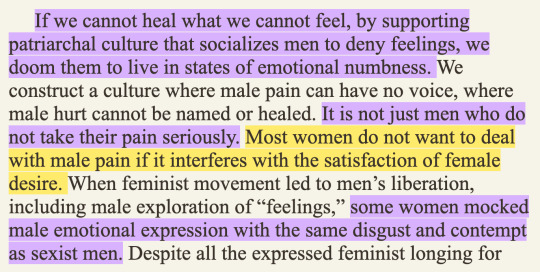

via The Will To Change: Men, Masculinity, and Love by bell hooks
are these the same men? are the men discussing male loneliness and emotional stoicism the same men that do not walk their friends home? or are you perhaps denigrating the feminist men who are actively trying to change their peers and the expectations placed upon men in friendship?
why do feminists think they sound cool when they say men should shut up about their feelings? how do they not hear every sexist asshole coach, teacher, and distant father figure screaming "boys don't cry" behind their own words.
already can't pretend to care about the male loneliness epidemic because it isn't real but listening to the way men actually talk about their friends/what they think friendship entails makes me care even less sorry
6K notes
·
View notes
Note
i would actually like to hear more of your thoughts on whipping girl, whenever you feel ready enough to talk about it. i've only ever heard positive recommendations for it. i was thinking of reading it. i've read one or two introductory 101 texts on transmisogyny as well as some medium/substack posts, and always looking to read more as a tme person. ty!
thanks for asking! I'm gonna try to be concise because I'm stuck on my phone for the month, but here are my thoughts on whipping girl:
serano is at her strongest in the book in three areas: manifestations of transmisogyny in media (e.g. how trans caricatures pervade movies), the history of medical institutions developing a pathology of transsexuality (like the diagnostics of blanchard et al. or how trans people seeking healthcare were and continue to be forced into acting out prescribed expressions and manufacturing memories), and the construction of her own transition narrative (telling the reader what it was like for her to grow up desiring femininity in a way that confused her, the experience of crossdressing, the effects of hrt for her)
whenever she's just sticking to this, I think she effectively communicates a lot that the unaware reader could benefit from—even many trans women/transfems/tma people who are otherwise in tune with the history of medicalized transsexualism and our popular depictions could probably benefit from her own personal narrative, by nature of how variegated our experiences can be.
unfortunately I think the book fails at its primary—stated—goal, which is to theorize about transmisogyny. in the big picture this is a bifurcated failure:
on one branch of her argument, she remains committed to there being something biologically essential/innate about gender. this manifests thru multiple claims: that we have "innate inclinations" toward masculinity/femininity and "subconscious sex" rather than what I believe, which is that the latter are constructed categories imposed on different matrices of behaviour/expression/desire in different cultural contexts; that there is "definitely a biological component to gender" (close paraphrase) after a discussion of how she believes E and T tend to affect people (thus equivocating gender with dominant hormones!); that we have such a thing as "physical sex" which is the composition of our culturally decided "sex characteristics" (don't ask me how the dividing line is drawn) even as she says we should stop using "biological sex" as a term; that there is "no harm" in agreeing that "sex" is largely bimodal with some exceptions; that social constructionism is necessarily erasure of transsexual experiences in early childhood... altogether she is unwilling to relinquish arguments about the partial "innateness" of femininity/masculinity and gender. this is at tension with her admission on several occasions that these are neither culturally/geographically nor temporally stable concepts! but that doesn't seem to be a line she can follow thru on.
on another, intertwining branch, she engages in what I think is a deep and widespread mistake in the theorizing of transmisogyny: reducing it (mechanistically) to anti-effeminacy. it is her stated thesis at the start that masculinity is universally preferred to femininity. she doesn't offer a definition of either term until one of the final chapters, where she defines them as the behaviours and expressions associated with a particular gender. but I think this reduction just misunderstands transmisogyny. it is even in tension with an observation she makes early on, that trans women are often punished for their perceived masculinity! but again, this is a thought she seems unable or unwilling to follow thru with.
my problem with the thesis is that masculinity and femininity do not float free of gender—it is not possible to speak of their valuation in the abstract. anyone who grew up as a masculine cis girl and never "grew out" of that "phase" can attest to the violence wrought upon expressions of masculinity from women. and this applies doubly so to the subjects of transmisogyny! not only are we punished for any perceived bleed-through of masculinity from our supposed "underlying male selves", those of us who are willingly masculine and thriving as mascs are punished for our failure to conform to the rules of the normative womanhood that is imposed on us (just as we are punished for any willing femininity as "false" and predatory upon cis womanhood—observe that transmisogyny is reactive degendering in every case!).
on both branches serano makes only perfunctory remarks about the intersections with race, class, and colonialism. "sex" as such was made to only be accessible to the "civilized", most of all the white european! for a racialized person and particularly a Black person navigating gender the waters are just not the same; the signifiers of sex neither available in the same way, nor granted the same medical legitimacy. what is the "physical sex" of someone who is de-sexed altogether? how can gender have a "biologically innate" component when its expressions between the bourgeoisie and the working class are at total odds with one another? this all goes for the masculine/feminine distinctions as well. what sense is there in the claim that we have innately masculine/feminine inclinations when globally (and transmisogyny has been made global!) what is feminine and masculine can be very nearly mirrored? nor is "masculinity is always considered superior to femininity" innocent of obviating race. transmisogynoir adds yet further degendering thru the coercive masculinization of someone as a Black woman—masculinization as punishment, again!
and as a final point, the account fails to be materialist. there is no attempt to place transmisogyny in its role as an instrument of political economy or, as jules gill-peterson might say, as a tool of statecraft. it is just a psychological response to the way the world is, as far as serano has anything to say about it. but how did the world become that way, and why?? serano's solution, the abolition of what she calls gender entitlement, is naive to the fact that gender entitlement is necessary to the maintenance of the capitalist state, which is structured thru patriarchy and built on colonialism. it is not possible to reskin this into something innocuous!
this is why I cannot recommend whipping girl as a work about transmisogyny except at the most shallow level. it could be a helpful critical read, but imo, it is just wrong about transmisogyny.
2K notes
·
View notes
Text
what murderbot saw through miki's eyes






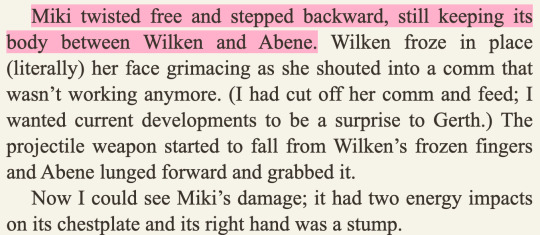



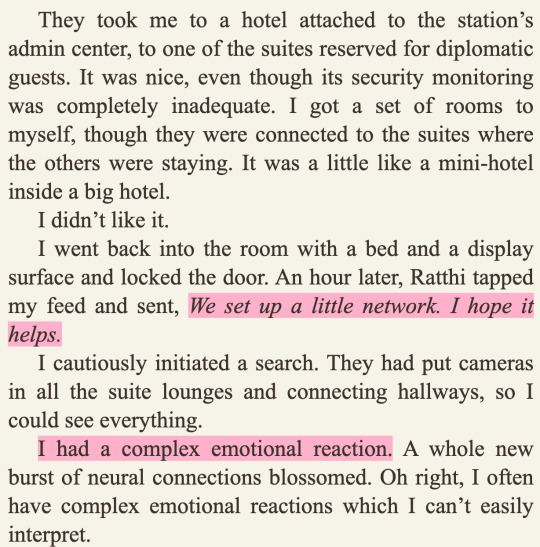
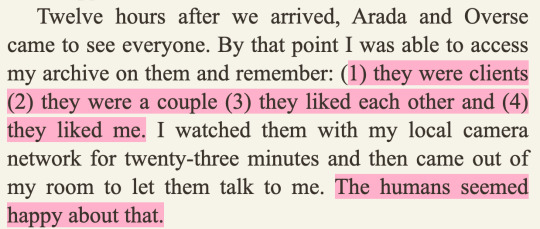


44 notes
·
View notes
Text

#the nations within#vine deloria jr#indigenous#restorative justice#landback#history#sioux#colonization#decolonization
5 notes
·
View notes
Text
excerpted from Almanac of the Dead by Leslie Marmon Silko
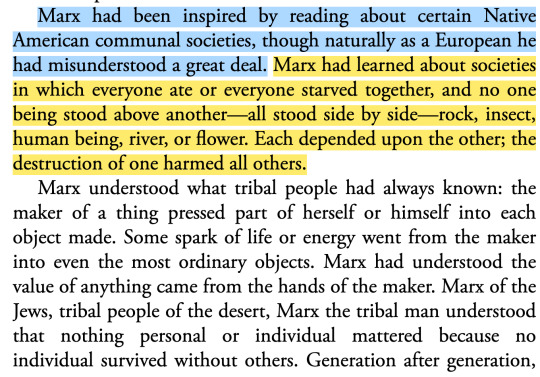
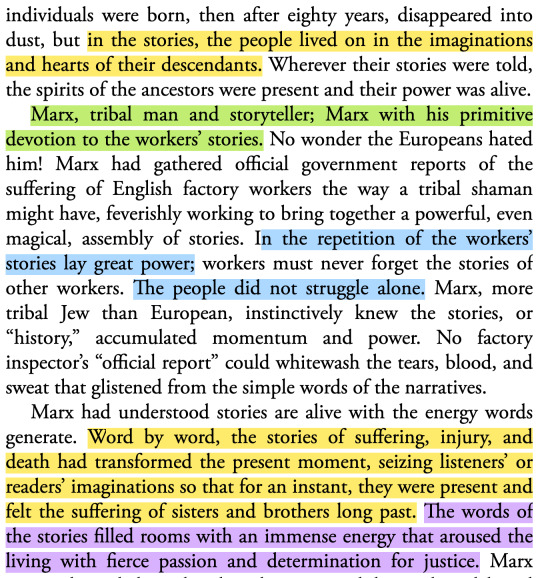
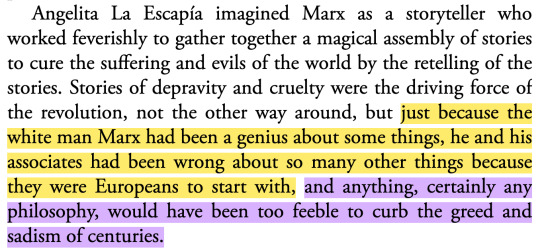

i've always found it... arrogant when primarily politically radical white people are so confident the answers lie in western traditions of democracy, as if our clumsy imaginations of equity and egalitarianism are superior to learning from real historical practice and the cultures that cultivated those practices. like idk i think the people who actually practiced egalitarian democracy are worth listening to.
anyway this is why I'm a leftist and not a communist or anarchist or any other ideology rooted exclusively in western traditions of thought. it alienates multicultural and particularly indigenous allies, and further, i just doubt the that europeans know best about everything. what i do know is we've made incredible mistakes with unquestionable belief in our own supremacy and refusal to consider the merit of other cultural and philosophical traditions.
i don't know why i'm seeing a bunch of posts go around about how it's not marxist to take an abolitionary stance on such-and-such because the dictatorship of the proletariat would have its own such-and-such. are we all not using the same marxist definition, aufhebung, abolition and supercession? it seems to me to be nonsense to argue that the bolsheviks did not abolish the tsarist police just because they had their own, or that the tsarist state was not abolished just because a socialist state was constructed in its place--this seems to be arguing from a very simplistic definition of 'abolish', right, where the things being abolished are not concrete relations of people and things but abstract concepts. i suppose it could be responding specifically to like, pop-leftists or anarchists who think of political action in purely negative terms but i don't think they're going to be very convinced by a defense of the DoTP.
211 notes
·
View notes
Text
time to return to my favorite review of all time:
Malfunctioning Sex Robot by Patricia Lockwood

0 notes


